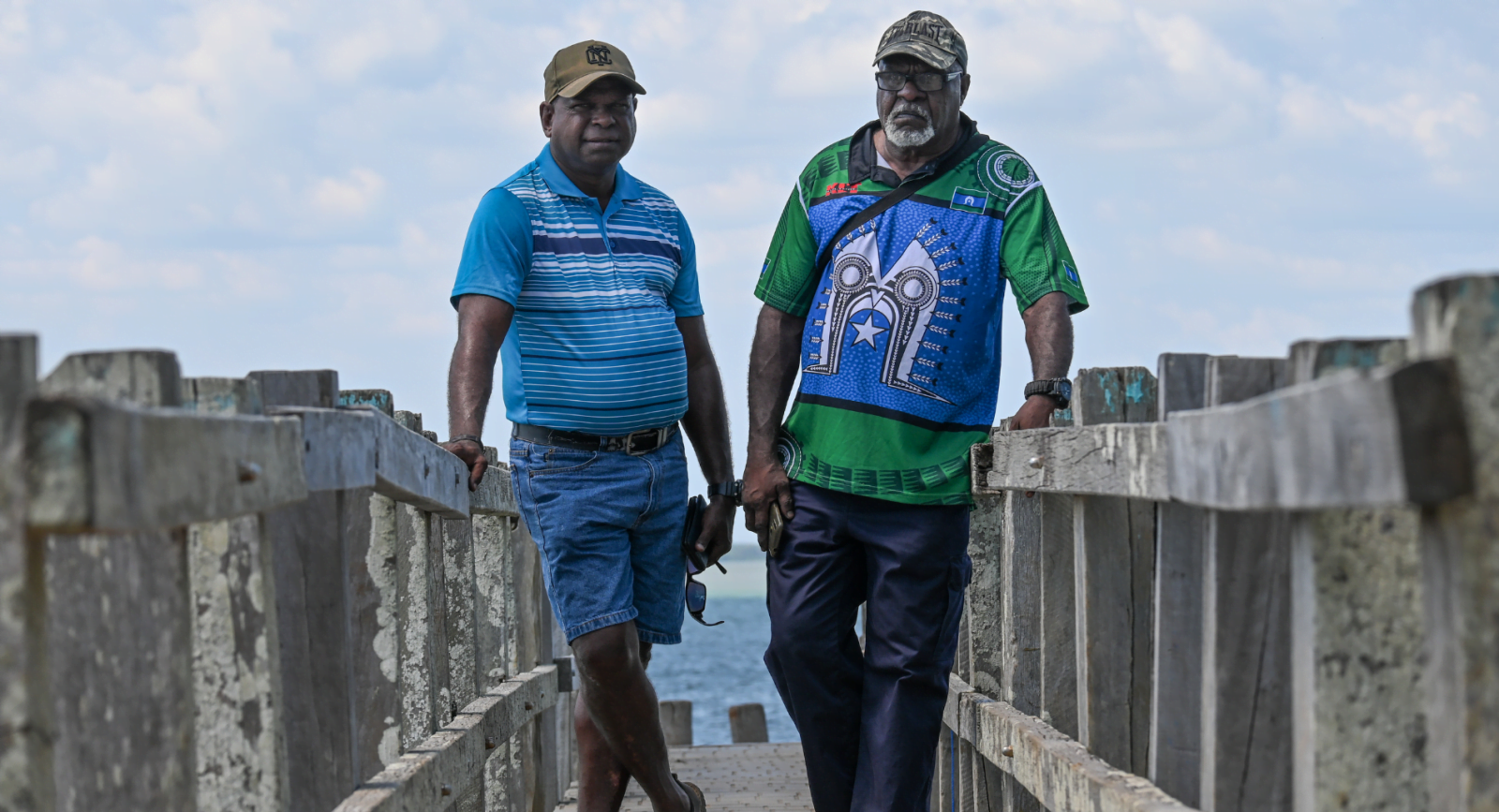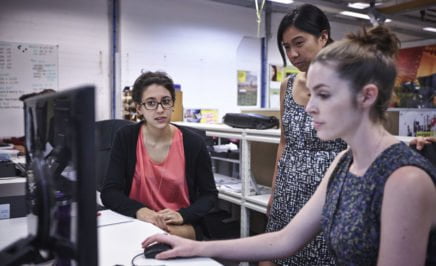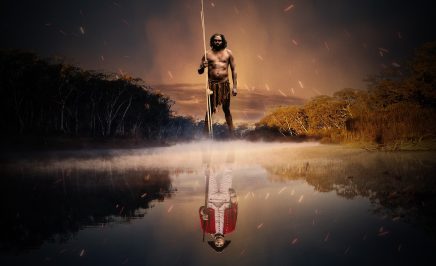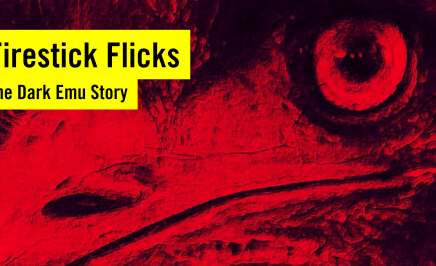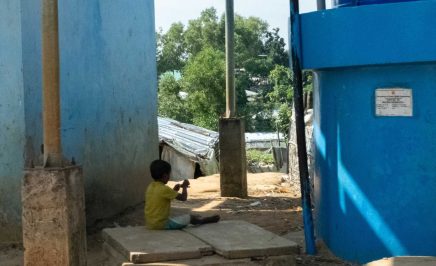Hello,
We’re Uncle Pabai and Uncle Paul. We’re two Traditional Owners from Guda Maluyligal in the Torres Strait, and we’re taking the Australian government to court for failing to prevent climate change.
Climate change is already here on our islands. Storm surges are getting worse and the seasons have changed as well. Our gardens now get flooded with salt water, and our homes, cemetery, school and community centre are all at risk.
Our sacred sites where we do ceremonies, and the knowledge and connection to Country that our ancestors have passed down for thousands of years could be lost.
If the government doesn’t change course, our homes could disappear beneath the rising seas and we will lose who we are, our culture and spirituality. We will be Australia’s first climate change refugees.
We have a responsibility to protect Country and our communities – and we hope that by bringing this case we will help all Australians affected by climate change.
From Uncle Pabai and Uncle Paul
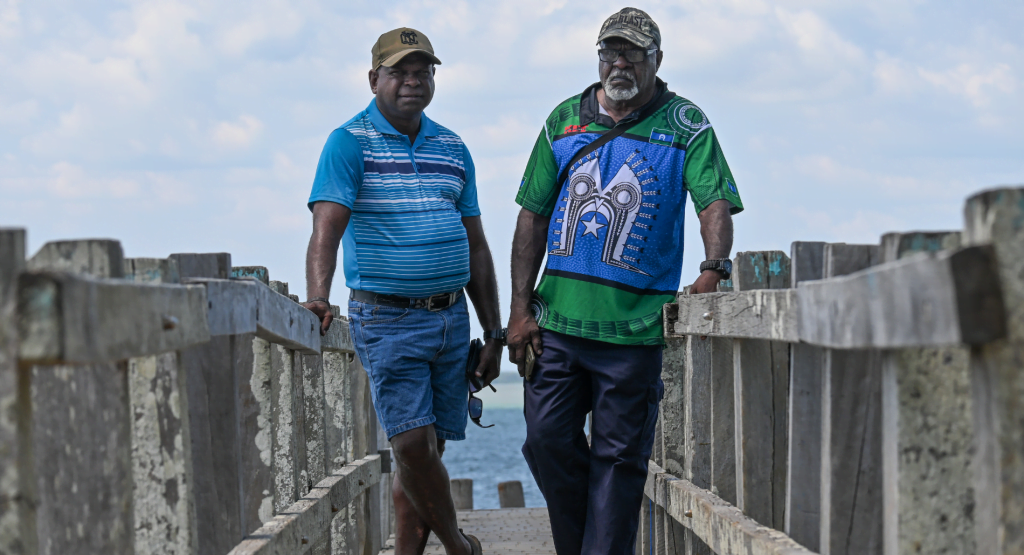
What is the Australian Climate Case?
First Nations communities are on the frontline of the climate crisis in Australia. Rising seas, increasing temperatures and changing biodiversity are already preventing communities from exercising their rights to self determination, practice culture, and the right to life, health, housing, food and water.
People living in the Torres Strait are at serious risk of becoming Australia’s first climate refugees. Sea levels are rising each year flooding homes, community infrastructure, gardens and cemeteries. If emissions are not drastically reduced, and fast, people will be forced off their islands and their connection to Country, culture and identity will be severed forever.
Two Torres Strait Islander men from the Guda Maluyligal Nation in the Torres Strait are taking a stand. Uncle Paul and Uncle Pabai from the Guda Maluyligal Nation have launched an historic legal action against the Australian Government for its failure to adequately reduce emissions and protect their islands and culture from climate change.
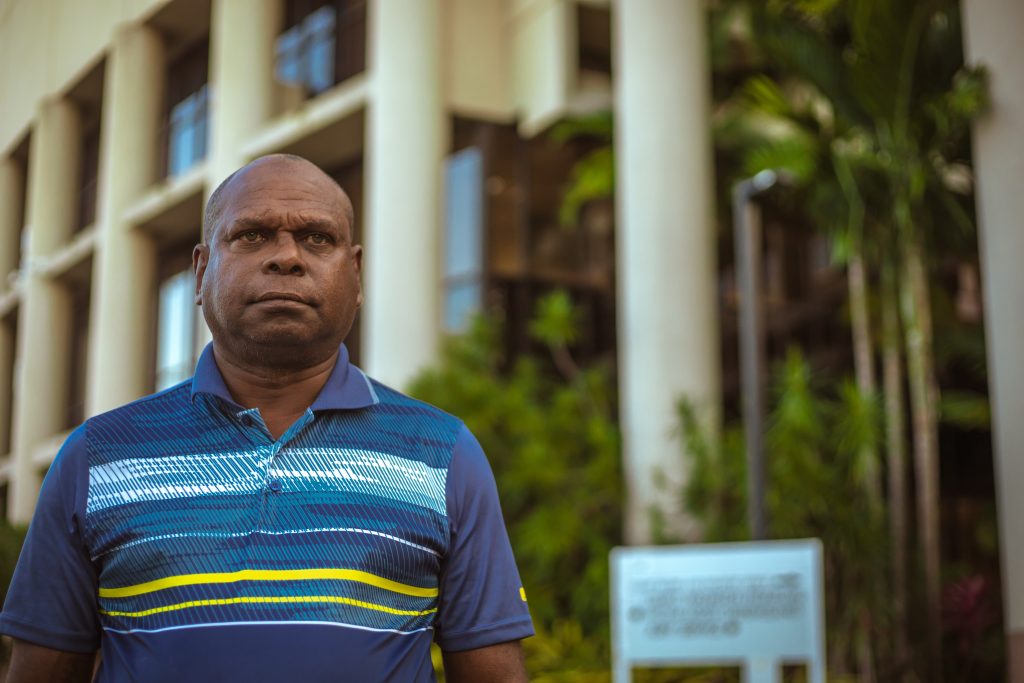
Wadhuam (Maternal Uncle) Pabai Pabai
Uncle Pabai is a Guda Maluyligal man and a Traditional Owner of the island of Boigu. He has five daughters and two sons. Uncle Pabai has lived on Boigu his whole life, and is a Director on the Prescribed Body Corporate that represents the 6 clans on the island.
Uncle Pabai says, Boigu is extremely low-lying – the highest point is 3m above sea level – making it very vulnerable to flooding. The flooding is getting worse because of climate change. As a Boigu man he has specific responsibility to protect sacred cultural sites but the rising sea is making it impossible and could mean they disappear forever. Loss of these places would be devastating for Guda Maluyligal communities now and for generations to come. That’s why he’s bringing this case – his cultural responsibility to protect my community, our culture and spirituality from climate change
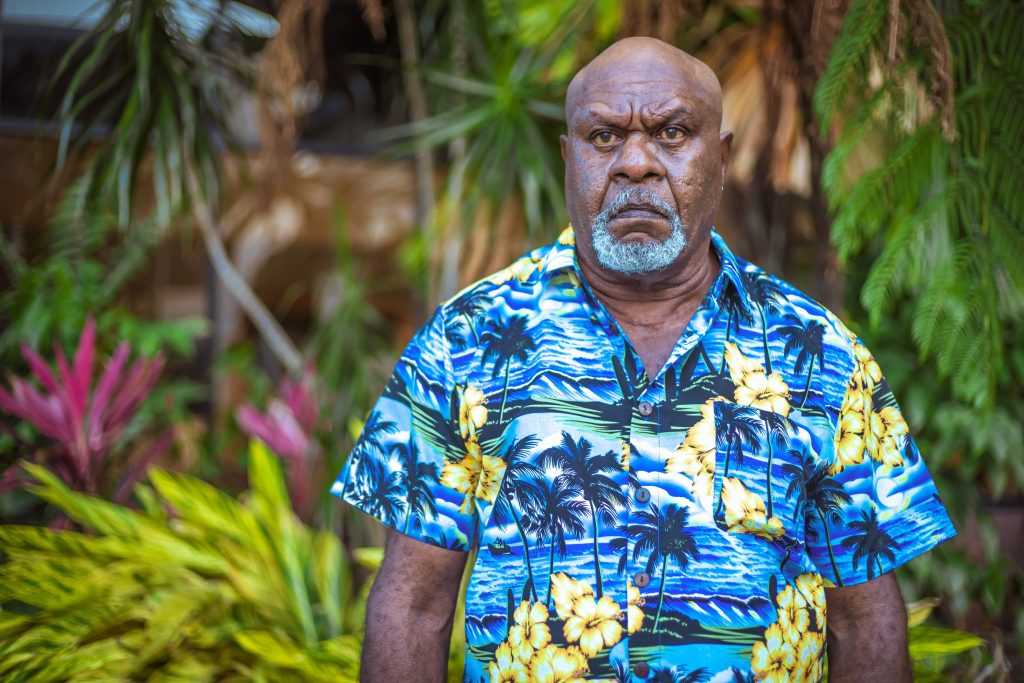
Wadhuam (Maternal Uncle) Paul Kabai
Uncle Paul is a Guda Maluyligal man and a Traditional Owner of the island of Saibai. He is a Director of the Prescribed Body Corporate which represents the 7 clans on the island. He has 2 daughters and six sons. Uncle Paul’s family has lived on Saibai island for thousands of years.
Uncle Paul says, if we become climate refugees we will lose everything: our homes, community, culture, stories, and identity. We can keep our stories and tell our stories but we won’t be connected to Country because Country will disappear. That’s why he’s taking the government to court, because I want to protect my community and all Australians before it’s too late.
Hear how climate change is affecting them, their islands, and their communities!
Uncle Pabai and Uncle Paul are arguing that the Federal government has a legal responsibility to ensure Torres Strait Islander Peoples are not harmed by climate change. In legal terms, this is called a ‘duty of care’. They will reason that by failing to prevent climate change the Australian government has unlawfully breached this duty of care, because of the severe and lasting harm that climate change would cause to their communities. They are seeking an order from the court requiring the government to prevent this harm to their communities by cutting greenhouse gas emissions.
Learn more about the case here!
People in the Torres Strait are on the frontlines of Australia’s climate crisis. And climate change will continue to affect us all if the government does not take serious and drastic action on climate.
Uncle Paul and Uncle Pabai’s case is currently in the Federal Court. If they win, the court will order the government to do more to protect their community from harm. At the moment the government says it will reduce emissions by 43% by 2030, but the experts say it needs to be 75% to protect our oceans, Country and the islands in the Torres Strait.
Uncle Pabai and Uncle Paul say their case is for all communities across Australia, the Pacific and the world. They want everyone to be safe. And because of this they are calling on all of us to raise our voices and call on the Australian government to reduce emissions in line with science.
Why is Amnesty International Australia working on this?
The case of Uncle Paul and Uncle Pabai talks specifically to the effects climate change has on our human rights; and to the reasons why as Amnesty International Australia we should stand alongside Uncle Paul and Uncle Pabai and First Nations communities.
Right to self-determination and the rights of indigenous peoples – While climate change is a global phenomenon, its impacts are unequally distributed and the impact on the Torres Strait Islands is immense. The UN Declaration on the Rights of Indigenous Peoples recognises the rights of Torres Strait Islander communities to self-determination (Articles 3 to 5), to life and security (Article 7), to not be subjected to the destruction of their culture (Article 8), to practise their cultural traditions and customs (Articles 11 to 15, and 20), and to maintain their distinctive spiritual relationship with their lands (Article 25). The effects of climate change, including the submergence and loss of sacred cultural sites to severe weather events and rising sea levels, pose a severe threat to these rights. Uncle Paul and Uncle Pabai’s ongoing advocacy and current legal case seek to remedy this.
Right to life, health, housing, water and food – Uncle Paul and Uncle Pabai are also advocating for their communities’ social and economic rights. They have seen devastating storm surge events which have flooded their communities and rendered people homeless, as well as the inability to grow fruit and vegetables in the soil due to saltwater intrusion. By advocating for greater government action on climate change, Uncle Paul and Uncle Pabai are working to protect rights to life, health, housing, water and food, as articulated in the UN Declaration of Human Rights (Articles 3 and 25), the ICESCR (Articles 11 and 12) and the ICCPR (Article 6).
Go to our Climate Justice page if you want to learn more about why climate change is a human rights issue.
Theory of Change – How Do We Win?
1 – Awareness and Local Action
We need to get people to learn and understand the impacts of climate change on Uncle Paul and Uncle Pabai and First Nations communities, and shift the conversation towards the need for more climate action.
Australians grow increasingly supportive of stronger action on climate change and the importance of cutting global emissions; as they continue to see the effects of climate change in their everyday lives.
People host petition stalls, community events, and more leading to increased awareness and a visible local demonstration of support and solidarity with the plight of Uncle Paul and Uncle Pabai.
2 – National Action
The more we mobilise, the more difference we can make. The effect of local activities and conversations between neighbours and friends snowballs into broader public support.
Collective actions, including holding events, writing solidarity messages, signing petitions and writing emails to politicians raise awareness for the case and contribute to calling on the Australian Government for more climate action.
3 – Mobilisation and Engage Decision-Makers
As the court case gets closer to its due date, people across Amnesty supporters alongside partners and the Australian public mobilise to get the Government to do more to protect our communities.
Politicians and decision-makers need to hear our message and see the level of public community support we’ve built to support Uncle Paul and Uncle Pabai in court and to push the Government over the line on climate action. Mail letters, call, visit or send emails to your Federal MPs.
4 – Campaign Win
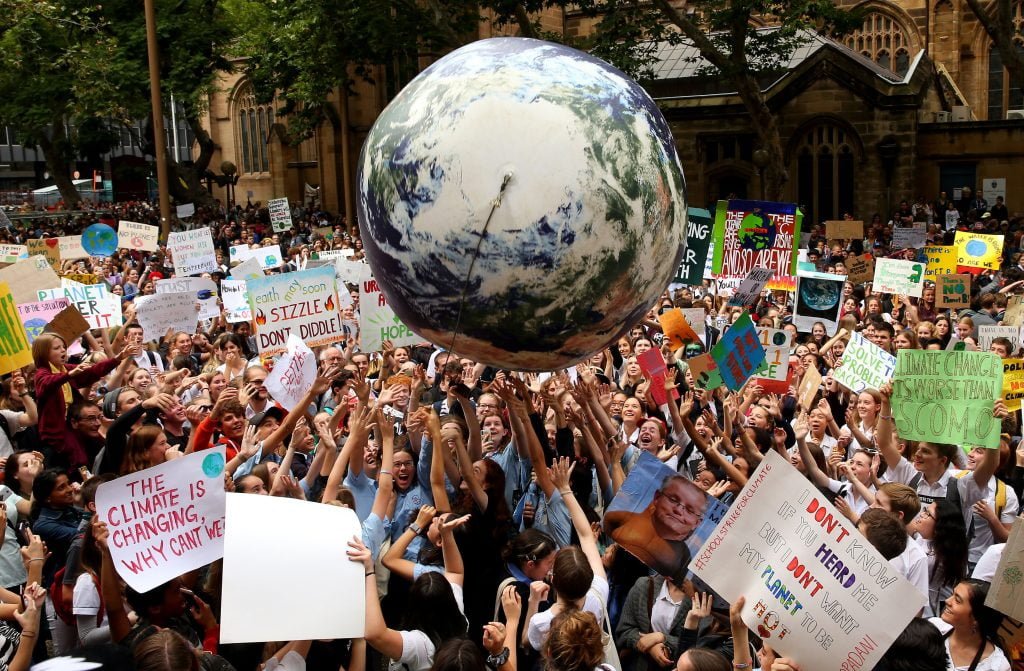
By building strong and visible levels of community support and by uplifting the stories and plight of Uncle Paul and Uncle Pabai, and First Nations communities, the Australian Government will take decisive action on climate change to protect the Torres Strait and the rest of our communities and our human rights. This can be done by increasing our legislated climate targets to at least 75% reduction in emissions by 2030 and adhering to climate science and immediately banning new coal and gas projects.
“We need to show the government that we exist here in the Torres Strait and we matter. We’re bringing this case not only to protect our communities, but all Australians from climate change. If we are going to create a better world for future generations we must work together.”
Uncle Paul and Uncle Pabai
Let’s Get To Work
What can you do in 2022?
Step 1 – Educate Yourself with these Resources and Take action
This toolkit and the resources linked in it are meant to be a tool for you to improve your understanding of how climate change affects human rights, and of the case of Uncle Paul and Uncle Pabai.
Now that you have educated yourself on Uncle Paul and Uncle Pabai’s case and the calls to protect the human rights of Torres Strait communities you are ready to take your first action, and share it in your community. Sign Amnesty’s petition now, calling on the Australian Government to take real climate action in line with science to protect the Torres Strait Islands and the human rights of First Nations peoples.
Another very important way to show solidarity with the Torres Strait Islanders and support their calls, is to show the Australian Government that climate change isn’t just a problem for people in the Torres Strait – it affects all of our human rights.
Uncle Paul and Uncle Pabai are sharing their climate story in court. Will you share your story and help us demand real climate action from the government? It doesn’t matter how big or small the impact you’ve felt – everyone’s story is important and together we can show the government that taking real climate action is in the interest of protecting the human rights of all Australians.
The first step is connecting all the things you learnt about climate justice and taking action; in 2023 you will get an opportunity to engage in actions that are directly targeted at getting the current Australian Government to listen to our calls for real climate action to protect the communities, livelihoods and Culture of people like Uncle Paul and Uncle Pabai.
Step 2 – Map your Community and Increase your Impact by Finding Partners
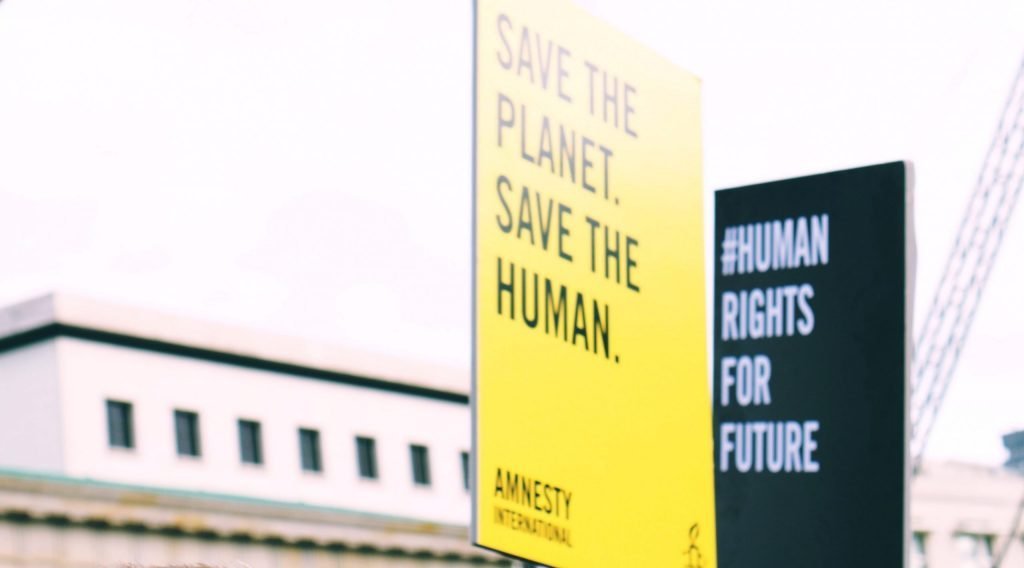
The better understanding you have of your community, the more people you can engage in the campaign and the more influence you’ll have on decision-makers later on. Do some research on what matters to your local community: how has your community specifically been affected by climate change? There will probably be groups and organisations in your area that are working on these issues already. It’s important to collaborate with them. Reach out to these groups and figure out what your value add could be and how your campaigns intersect. Would they be interested in connecting Uncle Paul and Pabai’s case to the local work they are doing on protecting communities from the effects of climate change?
Access our Skill Up Training Modules on how to map your community. Create a plan to roll out your campaign locally – think about how you will create partnerships, engage with your community and participate in mobilisations to support Paul and Pabai’s calls.
If they are unable to engage in our campaign right now, make sure you inform them of what you’re doing. Relationships take time to build and work both ways.
What is happening in 2023?
Step 3 & 4 – Influence the Narrative around Climate Change and Human Rights + Build Visible Community Support
We are building momentum on this campaign and on Uncle Paul and Uncle Pabai’s case all throughout 2023 and beyond depending on the result of the court case. In order to get the Australian Government to listen to us and to the calls of First Nations communities, we need to extend beyond our usual allies and show that there is support among a broad section of Australia. Our challenge for next year is to get creative, reach out to new audiences and demonstrate visible public support to force our leaders to act.
Plan an event that raises awareness and helps change people’s mind on the issue of climate change and human rights. Consider how you would reach new audiences with this event. Your goal should be to create events that allow you to talk to people about Paul and Pabai’s case and extend the support for their calls for increased climate action beyond the usual suspects. So get creative!
- You could host a community screening of the Hungry Tide by Tom Zubrycki and use this opportunity to talk about the Australian Climate Case and get people to get informed and take action. We have created a short event toolkit that covers the logistics of screening the documentary and highlights a few ideas for discussion or workshops to run after the screening.
- You could host a story-telling event where people share their experience of climate change and how extreme weather events have impacted their right to housing or to health. Uncle Paul and Uncle Pabai are at the frontline of the climate crisis, but getting people to empathise with their case will drive more action and engagement. You could use art or photography as well!
- You could organise a petition stall but add to your table a few images of the islands Uncle Paul and Pabai live on during King Tide events. Get people to connect with the idea that climate change affects the right to self-determination of First Nations people and the Australian government has a responsibility to act.
If you would like to host workshops with community members or in schools you can head to our Climate Justice (Human Rights Education) page. Varsha Yajman, an incredible youth climate justice advocate, helped us develop a series of 4 workshops, that can be run together or separately, on the issues of climate justice and climate activism tied to the case of Uncle Paul and Uncle Pabai. These are targeted at young people, but are easily adaptable to all ages
Step 5 – Demonstrate Your Community Power
This part will entail us thinking through opportunities for offline mobilisation before and during the hearing, and tactics that will highlight the groundswell of people supporting Uncle Paul and Uncle Pabai’s case. You can start planning from now on how you’re going to let vital decision-makers in your area know that there is strong community support for real action on climate that protects our human rights.
In the second-half of 2023, we will share with you resources to send personalised emails to your MPs that contain the stories of all the people in your community whose human rights have been affected by climate change. You will be able to organise a meeting with your local MP with fellow activists to let them know how supportive the community has been for this campaign.
Finally, it will be important to engage with local media to amplify stories that highlight the effects that climate change has had in your community, your calls for climate action and reach more people.
Can you think of anything else? Do you need support with a new idea? Reach out to Margherita (margherita.mezzasoma@amnesty.org.au)
Key Dates
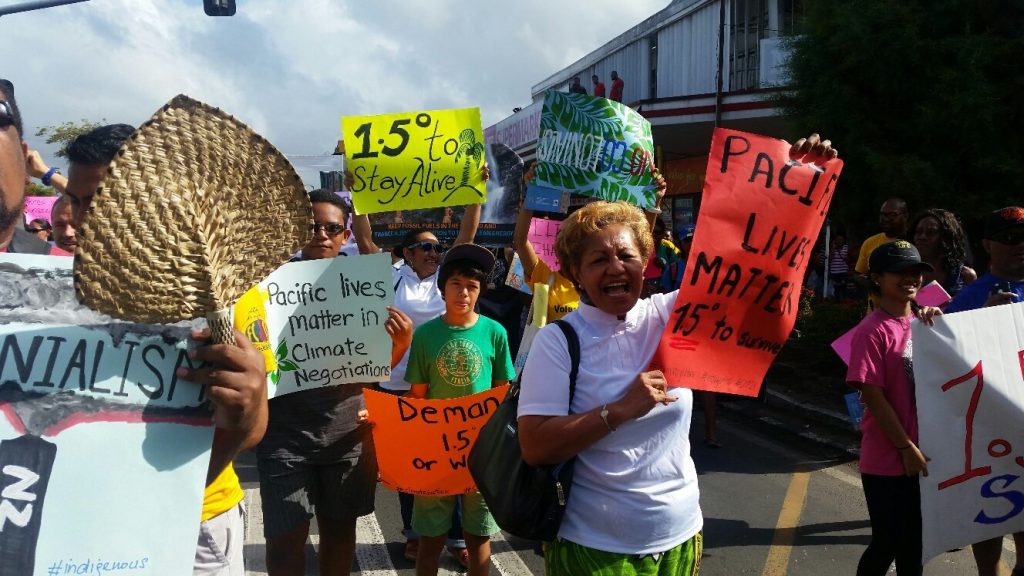
8th to 23rd November 2023: Hearing continues in Naarm/Melbourne at the Federal Court of Australia
17th November: Climate Strike #ShiftThePower
30th November to 12th December : COP28 in the UAE
Useful resources
More to come, so keep an eye out on this page!
- Online Course: Championing Change: Human Rights and the Climate Crisis
- Climate Justice Workshop Series – Developed by AIA and Grata Fund
- Host a screening to support the case of Uncle Paul and Uncle Pabai – Toolkit
Useful resources for activists at all times 🙂
- Partnerships and Community Mapping
- How to Engage with the Media
- How to Engage with Politicians
- Event Submission Form
- If you’re planning some grassroots campaign activities and would like physical copies of our postcard action, bumper stickers and corflutes, you can request them through this Event Submission Form. Just let us know what you’ll need in the ‘Do you require materials or other support?’ section.
- Campaigning for human rights can be difficult. Burnout and vicarious trauma can happen and it’s important to keep a look out for the signs in yourself and your friends. You can check out our Sustainable Activism & Self Care guide and workshop which you can find here. It examines how we can better take care of ourselves as activists and what you can do to make sure your activism is sustainable!

